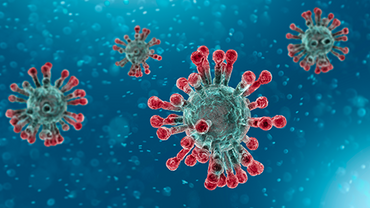ECDC Director: Protect people’s health this autumn through vaccination and other preventive measures
Statement from ECDC Director Andrea Ammon on the current state of influenza, RSV and COVID-19 with the arrival of autumn and winter.
“Europe will soon see the arrival of autumn and winter, where we anticipate a resurgence of seasonal influenza and RSV. We are also seeing small increases in SARS-CoV-2 transmission in the EU/EEA and anticipate that all three viruses will co-circulate in the coming months. With this, there is the need to highlight the importance of vaccination and other public health measures to protect people’s health.
In early September, increasing SARS-CoV-2 transmission had been reported by more than half of EU/EEA countries. These increases are likely contributed to by factors such as increased travel and large gatherings during the summer months, as well as waning immunity to infection following a long period of low virus circulation.
It is particularly important to keep a close eye on COVID-19 in older age groups. Out of 16 countries reporting data on age-specific case counts, nine have seen case numbers rise in people aged 80 and above and 12 countries in people 65 years and above. These increases have lasted one to eight weeks up to 10 September 2023.
COVID-19 deaths in absolute terms remain low compared to levels reported earlier in the pandemic. However, four out of 12 EU/EEA countries with age-specific death data have reported small, recent increases in deaths among people aged 65 years and above.
Critically, SARS-CoV-2 remains capable of acquiring mutations that can facilitate its continued circulation at unpredictable times throughout the year. The observed increases in SARS-CoV-2 transmission coincide with the emergence and dominance of a group of related Omicron sub-lineages, that are referred to as XBB.1.5-like variants carrying the F456L mutation.
In addition, a new Omicron sub-lineage, BA.2.86 was sporadically detected in August within and outside the EU/EEA. Although only a few cases have been confirmed globally, low-level community transmission of this variant is suspected in multiple countries. The variant is highly divergent from currently circulating SARS-CoV-2 variants, which could lead to increased reinfections.
For now, there is no indication that infection with these variants can cause more severe illness or make vaccines less effective against severe disease when compared to previously circulating variants. However, older people and those with underlying conditions are still at higher risk of severe outcomes if they get infected.
There is also an increase in the number of people going to their doctors with flu-like symptoms in many countries, with current levels being comparable to those in the same period last year.
In the last winter season, although SARS-CoV-2 circulated at much lower rates than in the previous two years, its impact was heightened by the co-circulation of influenza and RSV, resulting in healthcare services being put under heavy pressure.
Despite uncertainties as to how the 2023/2024 season will evolve, we need to act now to minimise the expected burden on healthcare systems caused by co-circulation of respiratory viruses.
It is important that priority groups get vaccinated against COVID-19 and influenza, in line with national recommendations, and combined autumn vaccination campaigns should be considered. The focus should be on vaccinating people who are more at risk of having severe disease caused by influenza and COVID-19, including older individuals, people with weakened immune systems and underlying conditions, irrespective of age, as well as those who are pregnant.
ECDC modelling shows that an autumn COVID-19 vaccination campaign with high vaccine uptake targeting individuals aged 60 years and above could prevent an estimated 21 to 32 percent of all COVID-19-related hospitalisations across EU/EEA countries until February 2024.
Vaccination of healthcare workers should also be considered, in line with national recommendations, because of their likely increased exposure to new waves of SARS-CoV-2 and influenza, and their key role in the functioning of healthcare systems. Vaccination saves lives, decreases the chances of being infected and reduces the risk of severe illness from COVID-19 and influenza.
Personal protective measures also help us keep respiratory viruses at bay. We continue to urge everyone to protect themselves by taking simple but effective measures such as cleaning hands regularly and wearing well-fitting masks - particularly when in healthcare settings or crowded closed settings with inadequate ventilation. Staying away from others when ill with a respiratory virus is also important.
Countries should monitor not only SARS-CoV-2, but also how influenza and RSV viruses spread throughout the season, and how they affect people and healthcare systems. Reporting these findings to ECDC will help us to better understand the impact of these co-circulating respiratory viruses, and further strengthen our prevention and control measures.
We cannot afford to be complacent, and by taking the necessary steps, we can prepare ourselves – at the EU level and within each country.”
- Andrea Ammon, ECDC Director







